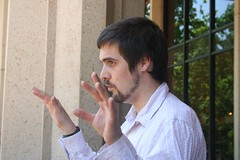the twit
2.15.2008
public tallying 2
less misanthropic today. also, i've reminded myself-- while re-reading my "i have a problem with ritual" mess-- that over the past few weeks i've herded various co-workers through a rather fixed loop from the office, to the starbucks in the student union, back to the office-- with specifics paths taken to approach and to leave the starbucks, and a with the same order made each time: a grande iced americano, no room for cream (but in which i allow a splash of milk, if only to watch the inky cloud resulting). this procession is-- at this point-- intentional, and comfortable. and a ritual, no doubt. as with my morning routine: press snooze three times, turn on the espresso machine, shower, dress, drink espresso, leave. this brings up the question: when does a routine become a ritual? what problems do i have with the ritual of walking down the aisle that i do not have with walking by the lyceum?
Subscribe to:
Post Comments (Atom)

5 comments:
Routine is something you do the same way.
Ritual is something routine but with an overarching meaning attached.
You got to make up the Lyceum ritual.
"what problems do i have with the ritual of walking down the aisle that i do not have with walking by the lyceum?"
Walking by the Lyceum doesn't change anything, doesn't make any new truths.
Your insistence that the other doesn't either may all be very Christian of you (or maybe not, what with the "confess with your mouth" business), but in defense of the Pharisee, consider and compare:
"I now pronounce you. . ."
"Order in the court,"
"Let there be light."
Words and symbols usually signify, but sometimes they legislate.
Further understanding ritual by the third person imperative:
From Mollin & Williamson, An Introduction to Ancient Greek:
"There is usually no precise equivalent of the 3rd person imperative in English. Euclid often uses it in expressions which are translated by 'let there be' or 'let there have been drawn.' In the Septuagint translation of the Bible, God uses the 3rd person imperative in the first five and one-half days' work: γενηθητω φως, 'Let there be light' or 'Be there light.' Perhaps an English example of the 3rd person imperative can be found in the stage direction 'ENTER the King.'
"What the commands of mathematicians, God, and playwrights have in common seems to be this, that the mere act of speaking suffices to bring about the truth of what is being said."
Post a Comment